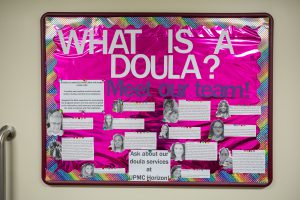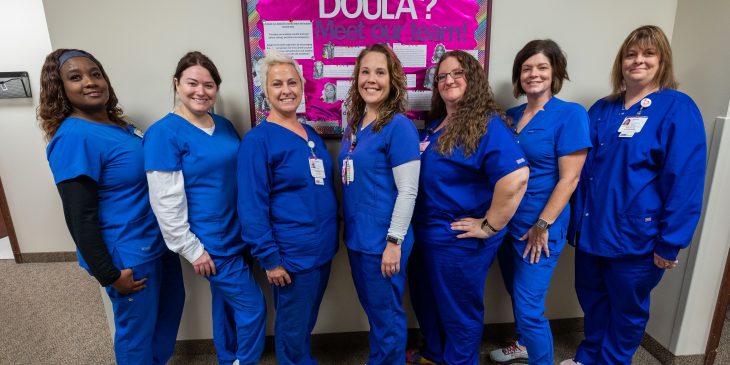This year, Birth Place at UPMC Horizon implemented a team of Birth Circle Doulas, trained professionals who provide emotional, physical, and informational support to pregnant patients before, during, and after childbirth. “Doulas encourage the birthing person and their support person to advocate for themselves to better interact with the health care team,” said Kimberly Leonard, Northwest PA regional director, Magee-Womens Hospital. “The presence of a trusted person during labor can make a big difference in having a positive birth experience.”
Led by Amanda Campbell, maternal nurse navigator, Northwest region and program director and doula, UPMC Birth Circle Doulas at Horizon support patients through their whole birth process. In the outpatient office setting, they conduct prenatal and postpartum visits. During labor in the hospital setting, doulas provide compassionate, continual support with the help of the hospital labor team. While doulas cannot provide medical care or administer pain medication, they can apply pain management techniques, including counterpressure and massage, which may allow the birthing person to labor without or with less medication.
“Research has found that people who use doula services have fewer medical interventions and fewer C-sections,” said Leonard. “While the program is new at UPMC Horizon, we’ve already seen some improvement in patient outcomes and a substantial increase in patient satisfaction for those patients choosing a doula assisted birth.”
Like Leonard, the doula team believes in the benefit of being supported through birth. Three doulas of the team shared their experiences, their thoughts on being advocates, and the benefit they have seen to having a doula as women enter a new stage of life.

Returning the Favor
After dreaming of this program for many years, Laura Sonney, birth doula, jumped at the opportunity to collaborate with Amanda Campbell to bring doulas to the UPMC Horizon community. “I didn’t know what the program would look like, but I knew I wanted to be a support system for other mothers,” she said.
“I know firsthand how beneficial it is to have a doula.” Amanda was Laura’s doula for two of her three deliveries. “Amanda’s calming presence was a big help,” she said. “She encouraged me to become a doula to process a situation I had.”
Since joining Amanda’s team as a mentor doula in 2016, Laura has witnessed its growth firsthand. “Since February, we have supported close to 90 patients,” she said.
As a doula, Laura helps patients create a birth plan. “I ask what their birth vision is in a perfect world,” she said. “Babies are their own people with their own little minds, so sometimes plans have to change.”
During the birth, Laura keeps the lights dim to relax her patients, telling them to focus on her face. She breathes with them, reminding them to keep their shoulders relaxed and to listen to their bodies. She reassures them with gentle touch to relax their body, reassuring them that the baby is not in distress while they push.
“At the end of the day, all we want is a healthy baby and healthy birthing person,” said Laura. “It brings me joy to be the support person for someone like Amanda was for me.”
Serving a Community
Each day, Rachel Campitell, birth doula, walks onto the labor and delivery floor ready for anything. “Babies come whenever they want to, so there’s no average day,” she said.
Rachel saw a patient alone in a delivery room. “She was very shy, so the doulas asked if she wanted us to sit with her,” said Rachel. The room filled with the calming presence of life, the doulas staying as doctors and nurses bustled in and out. They discussed the patient’s birth plan, wants, wishes, and hopes for the baby.
“We met on the day of the patient’s labor, but we dove in,” said Rachel. “After a complicated pregnancy, the patient did not know the gender of the baby.” To their surprise, a girl was born without a name picked out. “The next day, during the postpartum visit, I learned the patient named her baby Rachel, after me.”
Rachel’s path to becoming a doula started in medical school when she was placed on the labor and delivery floor. “At first, babies scared me because they are fragile, but when I saw what our bodies are capable of, I fell in love with women’s health,” she said. At each birth, Rachel’s goal is to make sure the patient never feels alone.
“It is a privilege to be a part of a community that serves a population in need of support,” she said. “I get to be the first person to tell a baby happy birthday and give them their first present.” In medical school, Rachel taught herself to crochet to keep her hands busy. Now, she crochets baby beanies to give to her patients.
Two Mothers, Two Sons
After her own pregnancies, Jamie Wilds, birth doula, returned to the workforce as a doula hoping to heal others in a similar position to her. “I felt compelled to support others through the hardships I experienced in my labors,” she said.
Recently, Jamie cared for a patient who was having her second son. “As a mother of two boys, I connected with her story,” she said. The patient’s first birth did not go the way she wanted, and she was looking for a change. “After a successful birth she was satisfied with, the patient’s second boy weighed exactly same as my second boy,” said Jamie. “Her birth was what I had hoped for, so it was healing for me to guide her through it.”
On how being a doula has changed her perspective on motherhood, Jamie explained how it has illuminated the dark spots expecting mothers do not discuss. “It is important that mothers know how difficult birth can be even when everything goes the way you plan,” she said. “Birth starts the journey of motherhood.”
“We have a special relationship with our patients, albeit brief.” Jamie often gets emotional during her patients’ births. “They can be scary, beautiful, redemptive,” she said. “It surprises me how much empathy and compassion can flow between somewhat strangers.”
The Gift of Support
“We’re very pleased that the doula program has far exceeded what we expected,” said Amanda Campbell, who has helped grow the program to 15 doulas. “Other benefits that can result from the use of doula services include increased rates of breastfeeding, higher satisfaction with the birth experience and decreased postpartum depression.”
Thanks to grants provided by the Buhl Regional Health Foundation and the Claude B. Lartz Charitable Trust Fund that contributed to education, equipment, and salaries, doula services are free of charge at Birth Place at UPMC Horizon.
In addition to the new doula program, Birth Place at UPMC Horizon includes a Level II NICU, couplet care, surgical suite for C-sections, telemedicine programs with UPMC Magee-Womens Hospital and UPMC Children’s Hospital and lactation consultants.
For more information on doulas, email horizondoulas@upmc.edu.
Journalists interested in learning more can contact mediarelations@upmc.edu.








